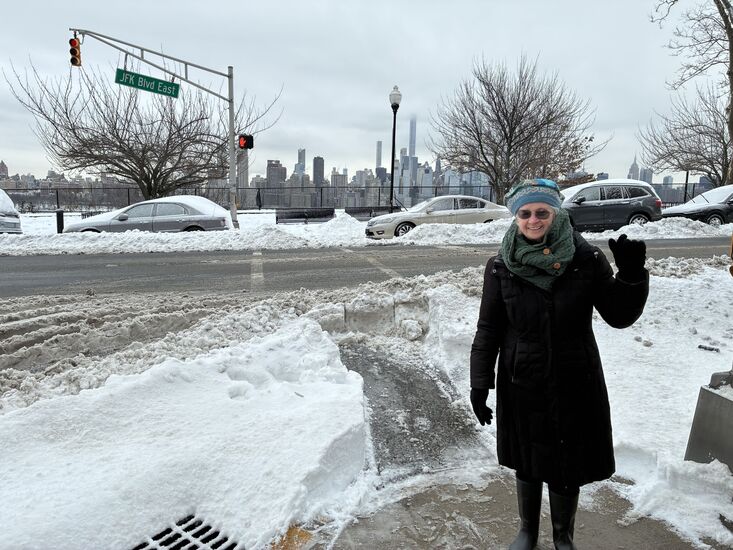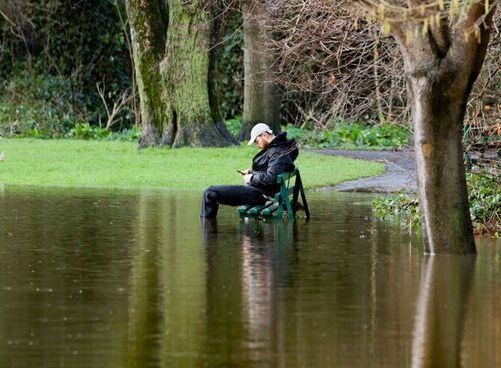Colin Breen, the author of “A Force Like No Other.”
Page Turner / Edited by Peter McDermott
One of the sources in “A Force Like No Other” said he is “a member of a very unique sort of club in that I attended my own murder. It’s a very strange feeling and I know I tend to make light of it, because I don’t know how else to deal with it. I think of that day and picture what I saw more often that I care to admit.”
You’ll have to read yourself Colin Breen’s book about the Royal Ulster Constabulary to find out the particular twists in that former policeman’s story. There are other stories just as fascinating from his colleagues included with it.
Said Henry McDonald, the longtime Observer and Guardian Ireland Correspondent, “Colin Breen has provided a most powerful and unique insight into the world’s most dangerous job in policing [according to Interpol] in the 1970s and ’80s.”
Breen said: “It's about the men and women who policed the Troubles and what their lives were really like during that terrible time on and off duty. I was a police officer myself during the Troubles and death and horror were part of our everyday lives.
“This is the frank and remarkable story of those lives,” he added, “of what it was like to be a cop: never hanging police shirts on the washing line; lying to children and friends about your job; checking over your shoulder and looking under your car for booby-trap bombs; always on the alert for things out of place. At times it stretched us to breaking point.”
Breen said: “I'd felt very strongly for some time that our voices had not been heard in the narrative around the Troubles so I wrote down my own memories and stories and set out to interview former colleagues from Special Branch and CID before they were lost to time. None of them had told their stories before, not even to their families. I’ve pretty much included them as they were told to me with just the odd tweak for clarity. I used the 24-hour clock in an attempt to put the reader in the front seat of the police car dealing with whatever was thrown at us as the calls came in.
“I hope the book gives a good sense of the extraordinary times we lived through and of the camaraderie and black humor that is common to police officers the world over which got us through some very dark days - with of course the odd whiskey,” he said.
Indeed Breen – who has worked with Sky News, RTE, UTV and the BBC and writes regularly for daily newspapers – had started out writing a book about that black humor and camaraderie. The former professional golfer David Feherty, now a columnist and broadcaster, focused on those aspects of it in an endorsement. “If you like dark and inappropriate humor – pick up this book. Great read, very moving and funny,” Feherty said.
During the Troubles, the RUC lost 302 officers (another 17 were retirees when they died in attacks), while it killed 55. It recorded over 10,000 injuries with 300 left disabled or otherwise very seriously injured. Breen writes: “Almost 70 officers committed suicide.”
The now disbanded RUC was much praised as a professional police force and its officers won numerous awards for bravery, but it also faced allegations of human rights violations and of collusion with Protestant parliamentary groups. On the issue of collusion, Breen told the Irish News in Belfast that if it had “been systemic that would have meant every single officer being in on this conspiracy and not talking about it - think about how ludicrous that sounds.”
“The RUC was a hero organization to some and a villainous one to others,” wrote Joe Cushnan in a review for the Belfast Telegraph, “a book like this helps to separate fact from fiction and reinforces that at the heart of our history, human beings make the war and make the peace.”

Colin Breen
Place of birth: Bangor, Co. Down
Partner: Gillian
Children: Two daughters of whom I could not be more proud (most of the time!), Rebecca, who is a teacher, and Johanna, a doctor.
Residence: Three-story terrace overlooking the Irish Sea
Published works: My book “A Force Like no Other” now available in the United States and countless newspaper articles.
What is your writing routine? Are there ideal conditions?
Get at it in the morning, when I think I’ll leave it until after lunch it tends not to happen. It’s no crime to take a day off or life gets in the way. If you aren’t in the mood walk away – it’s hard to force but you will get there.
What advice do you have for aspiring writers?
Get something down on paper – there will be plenty of time to revisit later. Write what you know about. Family support is invaluable and to that end Gillian, Lynda, Rebecca and Johanna are the perfect nags!
Name three books that are memorable in terms of your reading pleasure.
“The Choirboys” by Joseph Wambaugh; “Papillon” by Henri Charriere; “The Old Man and the Sea” by Ernest Hemmingway.
What book are you currently reading?
“Firefly” by Henry Porter.
Is there a book you wish you had written?
No.
Name a book that you were pleasantly surprised by.
“The Company” by Robert Liddle.
If you could meet one author, living or dead, who would it be?
Winston Churchill.
What book changed your life?
“The Bourne Identity” by Robert Ludlum. An understated lesson in situational awareness!
What is your favorite spot in Ireland?
Dublin.
You're Irish if.....
You can't remember leaving the pub.







